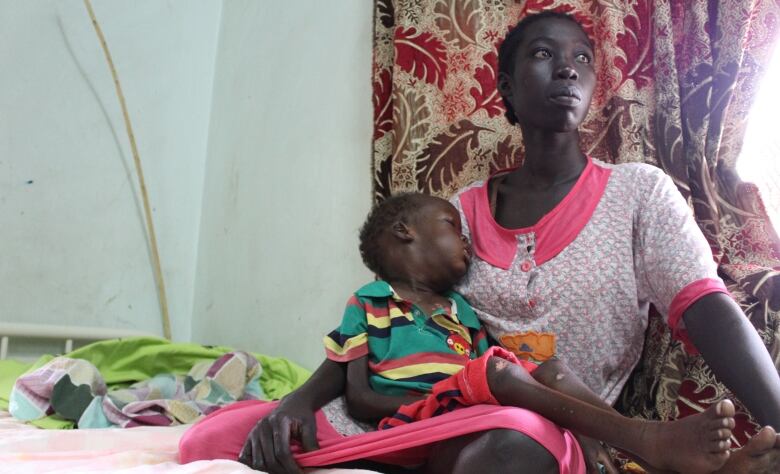'When you're dealing with children, it's always going to hit home': Margaret Evans on South Sudan
CBC correspondent gives her perspective on the famine and fighting in South Sudan
CBC foreign correspondent Margaret Evans has returned to London after visiting South Sudan, a country in the throes of civil and ethnic warfare where the UN estimates roughly five million people are at risk of hunger. In the capital, Juba, she witnessed children dying of malnutrition in the state children's hospital. And in the UN camps, she met some of the thousands of people displaced from their homes by hunger or who fledin fear of soldiers.
Evans spoke about her work in South Sudan withthe CBC's Mark Kelley on this week'sThe Investigators.
You've been to Africa. You've reported on famine. You've reported on tragedy before. But on a personal level, how did this one hit you?
Well, it was worse than we expected. And, of course, when you're dealing with children, it's always going to hit home a lot deeper. And as it turned out, in the end, some of the children we were meeting, it was really their last moments on this planet. And so, of course, that's going to impact you.
You're very conscious of needing to deal with their memory correctly and trying not to make those final moments for them worse. So, yes, difficult.

As you look around you and you see that you're surrounded by this tragedy in that moment, what do you feel is your responsibility?
Well, I think the responsibility in the first instance is just to get there. You can't make people care if you don't go there. You can't make people understand on a much deeper level if you're just rewriting somebody else's wire copy.
South Sudan is a difficult country for journalists to operate in. They're not particularly welcome. It's getting harder and harder to get visas there. Even aid agencies are having trouble operating there. So getting there is half the battle.
- Why South Sudan's famine will continue 'for a long time'
- South Sudanese trapped by war, famine grow desperate
And when you do, it's not difficult [to tell the story]. It's very easy for me to say to you, I stood before a man who had his dying child in his arms and the arms of that father were so skinny it looked like he couldn't even hold up that child. The minute I say that to you, I hope it travels across the miles. And the picture, as they say, speaks louder than words.

You're just there, doing your job, and reporting the facts to the Canadian public. What do you hope the reaction will be, both from the Canadian governmentand from the Canadian people?
Obviously as journalists our job is to help people understandand make up their own mind about how best to help a situation, whether or not to get involved. So you hope that you can kind of clear away the weeds, make people understand what the war is about, why it's still happening, what international players are doing on the stage to actually stop the war.
- Crowded UN camp filled with horror stories
- Canada urged to boost troops to aid in South Sudan crisis
When we hear "famine,"we tend to think about drought. You know, in sort of the Biblical way. This, of course, is a man-made famine. This is a country that is Africa's newest nation it's just about to be six years old. It didn't last more than three years before it descended into civil war. And that is what is driving the famine, on top of the difficult climatic conditions, on top of the distance and the lack of development in the countryand the lack of good governance.
So, by presenting that picture, hopefully you give people the tools they need to impact their MPs or governmentif that's what they want to do.
Watch The Investigators Saturdays at 9:30 pm ET and Sundays at 5:30 pm ET on CBC News Network.













_(720p).jpg)


 OFFICIAL HD MUSIC VIDEO.jpg)
.jpg)



























































































